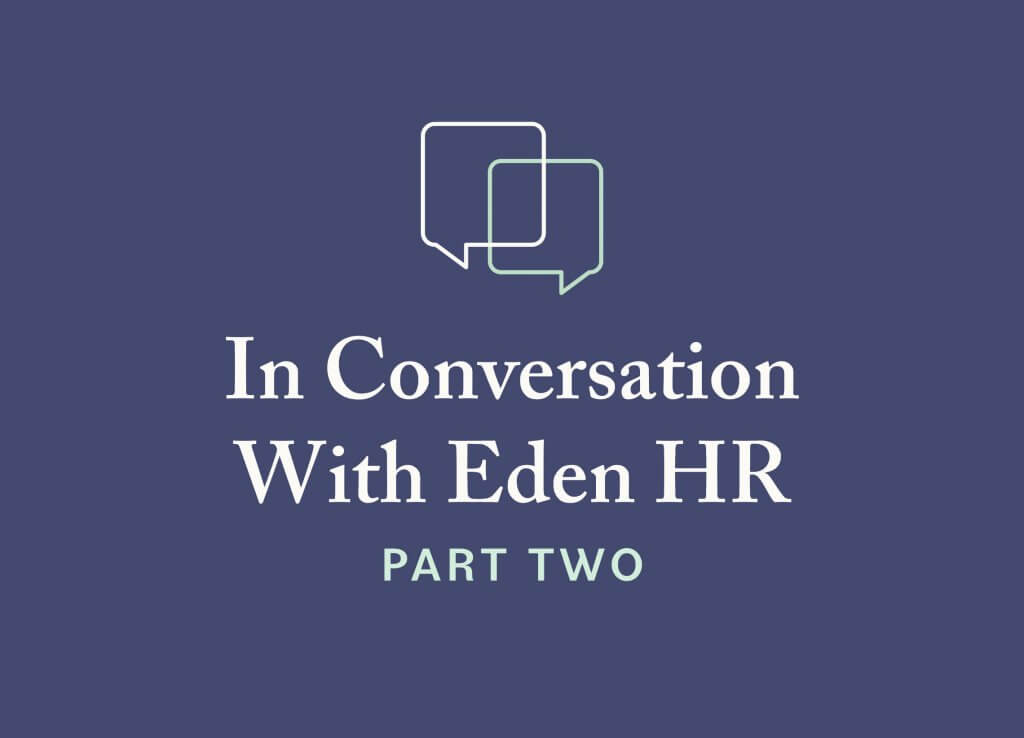In part one of a conversation with Eden Health’s Nyala Khan, Head of Talent, and Megan Means, Manager of Talent, they explain how Eden continued cultivating company culture in the early days of the COVID-19 pandemic and beyond. Now, in part two, they discuss how to tackle some of the questions employees may have as we move into a new phase of the pandemic: vaccination rollout and returning to work safely.
Share advice from the experts.
During the pandemic, we wanted to show employees how to keep themselves and their families healthy. We had our Chief Medical Officer running Dr. Fauci-style sessions every morning, advising the company on the latest information, even as it was constantly changing. We were very fortunate to have clinical partners drive those conversations as leaders within the organization. Obviously, not every company will have that expert guidance on hand, but you should still continue to share verifiable facts and updates about COVID-19 with your workforce. Our state-by-state guide is a great resource that compiles the most recent local guidelines for vaccine eligibility where you and your employees are located.
Set realistic expectations around vaccinations.
Employees will want information about when and how to receive a COVID-19 vaccination as soon as possible. Again, you should listen to the experts, know the vaccination timelines they’re outlining, and share that knowledge as it evolves with your employees. Eden is carefully monitoring the guidance around rollout plans and won’t undercut the advice of health officials as we make incremental plans to reopen.
Have a plan for navigating tough discussions.
You may encounter some reluctance from members of your workforce when it comes to getting vaccinated. Rely on the facts to keep your employees safe, healthy, and informed. Let them know that widespread vaccine distribution will be critical to fighting the transmission of COVID-19 moving forward. Be prepared to talk, in good faith, about the rights of employers outlined by the Equal Employment Opportunity Commission and emerging guidance from federal and state governments. Keep yourself informed about potential exceptions employees may ask you to accommodate when it comes to getting vaccinated. We’ve found that explaining the bigger “why” around the importance of vaccination helps reluctant employees feel more comfortable about the prospect of getting one. Our eBook, Returning to Work Safely, gives you six protocols to utilize while creating your return-to-work plan, including how to handle a vaccination rollout for your employees.
Make your benefits more inclusive.
Employers should be clear about the benefits they offer and what exactly their value is — it’s imperative to clearly communicate what you’re offering your employees. You can add value to your benefits by making them more inclusive and expanding who in that person’s family is also eligible for those benefits. At Eden, we’ve started paying a greater percentage for dependents and family members. That sounds very basic from a health, dental, vision standpoint, but people don’t take that stuff for granted. It becomes an even stronger retention tool and when we can present that information to candidates, they’re impressed because it’s not what they expect from a company of our size.
Provide mental health support.
It’s just as important to support the mental health of employees as it is their physical health. The impacts of poor mental health in the workplace are clear: stress and anxiety can lead to employee turnover, decreased morale, and low productivity. This support became even more critical as employees across the country dealt with the numerous emotional fallouts of the pandemic.
Companies should encourage employees to seek the support they need and if possible, subsidize the cost of that care. Talk therapy can help individuals capture how they’re feeling emotionally and develop tools for understanding and coping with stressful situations. This kind of engagement is so beneficial on an individual level and will ultimately translate to the collective work your employees are undertaking.
Look after yourself, too.
After you’re done taking care of employees, management, the company mission, and the bottom line, don’t forget to take care of yourself! HR teams spend so much time and energy figuring out how to care for and engage our employees that we don’t always take the time to focus on ourselves. This might look like actually using your PTO, scheduling a recurring midday meditation session three days a week to force yourself to disconnect and recenter, exercising when possible, or doing something that will regularly bring you joy — subscription boxes that cater to your interests are great for this!
It’s important to allow yourself not to be perfect — be flexible, don’t be so hard on yourself, and let yourself make some mistakes along the way. The pandemic — and emerging from it — has been a new experience for everyone and we’re all navigating it together.
Disclaimer: This information is based on current resources available and is subject to change. This document and its contents are provided for informational purposes only, and not intended to be, and should not be understood or treated as, a substitute for professional medical advice around COVID-19, its risks or symptoms, or to take the place of any local, state and national laws and guidelines around COVID-19. Always seek the advice of a physician or other qualified health provider with any questions you may have regarding a medical condition.





